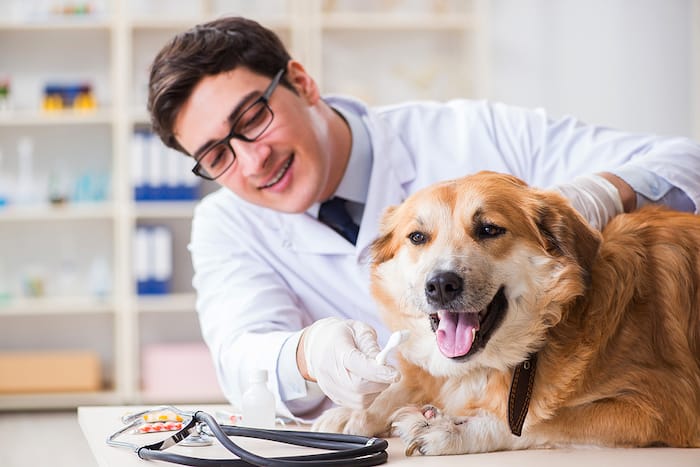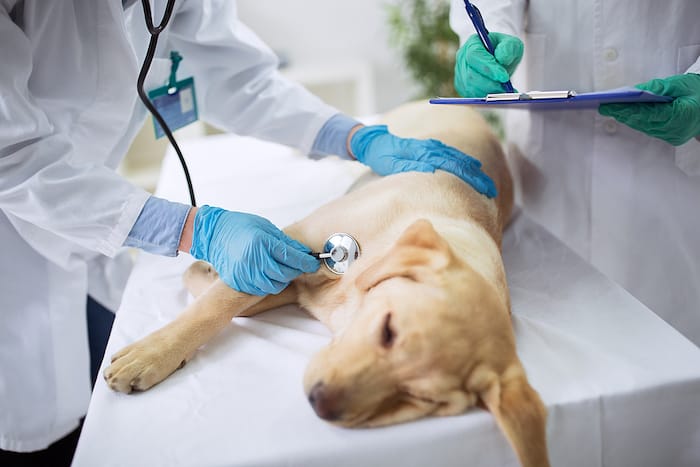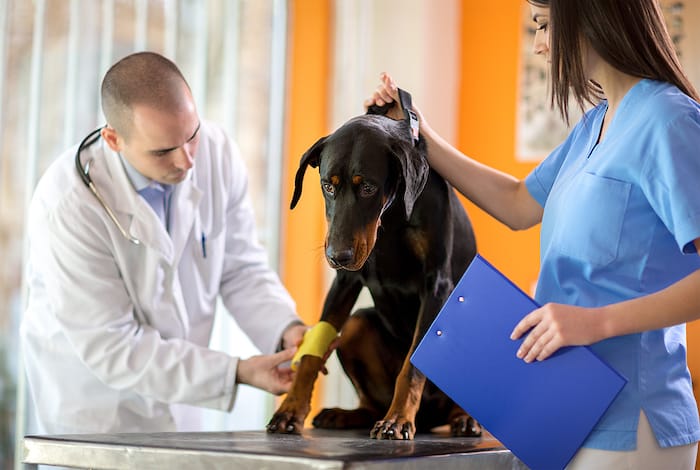Regular visits to the veterinarian are essential for the health and well-being of your dog. Routine veterinary care helps to prevent and detect illnesses early, which can increase the chances of successful treatment. But how often should you take your dog to the vet? We will explore the answer to this question and the importance of regular veterinary check-ups.
Adult Dogs
The frequency of veterinary visits depends on several factors, such as the age and health status of your dog. As a general rule of thumb, healthy adult dogs should visit the veterinarian once a year for a routine check-up. Puppies and senior dogs, however, may require more frequent visits.

Puppies
Puppies require a series of vaccinations in their first few months of life to protect them from diseases such as parvovirus and distemper. Typically, puppies should visit the veterinarian for vaccinations every three to four weeks until they are 16 weeks old. After that, they should have a check-up every six months until they reach one year of age.
Vaccinations
There are several recommended vaccinations that puppies should receive to protect them from common and potentially deadly diseases. Here are some of the most important vaccinations and the recommended times they should be given:
- Distemper, Hepatitis, Parvovirus (DHPP): This combination vaccine protects against three potentially deadly diseases. It is usually given in a series of three shots, starting at 6-8 weeks of age, with boosters given every 3-4 weeks until the puppy is 16-20 weeks old.
- Rabies: This vaccine is required by law in most states and protects against the deadly rabies virus. It is usually given between 12-16 weeks of age, with boosters given every 1-3 years depending on the laws in your area.
- Bordetella: This vaccine protects against kennel cough, a highly contagious respiratory disease. It is often required for puppies that will be attending doggie daycare, boarding facilities, or group training classes. It can be given as early as 6 weeks of age, with boosters given every 6-12 months.
- Leptospirosis: This vaccine protects against a bacterial infection that can cause liver and kidney damage. It is often included in the DHPP vaccine, but may also be given separately. It can be given as early as 6 weeks of age, with boosters given annually.
Your veterinarian may also recommend other vaccines based on your puppy’s individual needs and risk factors. It’s important to follow your veterinarian’s vaccination schedule and keep your puppy up-to-date on all recommended vaccines to ensure their health and well-being.
Getting Your Puppy Fixed
The timing of when a puppy should be spayed or neutered can vary based on several factors, including the breed, size, and overall health of the puppy. Here are some general guidelines:
- Age: The traditional age for spaying or neutering puppies is between 6-9 months of age. However, some veterinarians may recommend waiting until the puppy is a bit older, especially for larger breed dogs, to allow for proper growth and development.
- Weight: Some veterinarians may recommend spaying or neutering a puppy once they have reached a certain weight, usually around 2-3 pounds.
- Health: Puppies that have certain health conditions may need to delay their spay or neuter surgery until they are healthy enough to undergo the procedure.
- Behavioral issues: In some cases, veterinarians may recommend early spay/neuter (around 8-16 weeks of age) for puppies that are exhibiting certain behavior issues, such as aggression or marking.
Seniors
Senior dogs, on the other hand, should visit the veterinarian at least twice a year. As dogs age, they become more susceptible to health issues such as arthritis, dental disease, and cancer. Regular check-ups can help detect these issues early, which can improve the chances of successful treatment.

Signs a Vet Visit Is Needed?
If your dog has a chronic health condition, such as diabetes or heart disease, they may need to visit the veterinarian more frequently. Your veterinarian will work with you to develop a customized schedule of veterinary visits based on your dog’s specific health needs.
Aside from routine check-ups, there are several other situations when you should take your dog to the vet. These include:
- Unusual behavior: If your dog is lethargic, vomiting, or has diarrhea, they may be sick and should be seen by a veterinarian.
- Injury: If your dog is injured, they should be seen by a veterinarian right away. Delaying treatment can lead to complications and may make the injury worse.
- Change in appetite: If your dog suddenly stops eating or has a decreased appetite, they may be experiencing a health issue that requires veterinary attention.
- Dental issues: Dental disease is common in dogs and can lead to serious health issues if left untreated. Regular dental cleanings and check-ups can help prevent dental disease and catch it early if it does occur.
It’s important to remember that each dog is unique, and their veterinary needs may differ. Your veterinarian will work with you to develop a customized schedule of veterinary visits based on your dog’s individual needs and health status.

Preventative Care
In addition to regular veterinary check-ups, there are several things you can do at home to help keep your dog healthy. This includes providing a balanced and nutritious diet, regular exercise, and grooming. It’s also important to keep up-to-date with your dog’s vaccinations and parasite prevention.
Regular veterinary visits are essential for the health and well-being of your dog. The frequency of veterinary visits depends on several factors, such as the age and health status of your dog. As a general rule, healthy adult dogs should visit the veterinarian once a year for a routine check-up. Puppies and senior dogs may require more frequent visits. Your veterinarian will work with you to develop a customized schedule of veterinary visits based on your dog’s individual needs. Remember, prevention is key, and regular veterinary care can help prevent and detect illnesses early, which can increase the chances of successful treatment.
Related Reading
Reviewed by: Tim Winter

Tim Winter has dedicated his writing and research efforts to animals and wildlife. He explores the globe and sees firsthand the negative impact humans have on the environment. Tim is dedicated to promoting responsible environmental stewardship. He holds a Bachelor of Science in Advertising from the University of Oregon School of Journalism and Communications.
